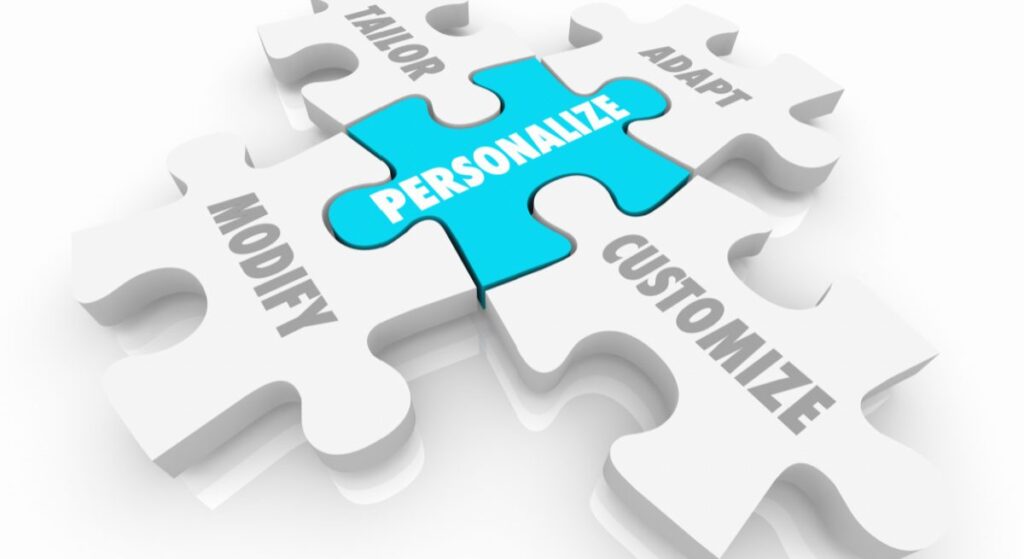In the dynamic world of marketing, the era of personalization is upon us. Fueled by artificial intelligence and advanced data analysis, marketers are shifting their strategies toward individualized consumer experiences. From enhancing predictions to automating routine tasks, creating immersive experiences, and establishing an ethical framework, AI is revolutionizing the landscape. But, how can we best harness this technology to meet consumer needs, build meaningful connections, and maintain trust? Let’s delve into the transformative power of AI in marketing and explore how this technological marvel is shaping the future of customer engagement.
Making Marketing Personal: A New Era of Individualization
For years, the marketing world has buzzed about the importance of personalization – the idea of truly knowing each customer as a unique individual with distinct needs and preferences. Yet, due to the constraints of older technologies, personalization often didn’t extend beyond basic segmentation and generic messaging.

Enter artificial intelligence, the game-changer in this narrative. AI-powered marketing platforms can now pinpoint individual consumer behaviors, interests, and values with an impressive level of precision. They use this understanding to provide experiences, recommendations, and offers that align with the specific interests of a single person at a precise moment.
AI doesn’t just bombard people with irrelevant content; it helps brands cultivate genuine relevance. Early results suggest that people appreciate communication tailored to their preferences. Recent studies reveal that personalized mobile push notifications, based on individual user data, have open rates more than double those of generic bulk messages. Similarly, personalized email subject lines see open rates 58% higher than average. When recommendations, like product suggestions or content, align with someone’s personal preferences, they are far more likely to inspire action. AI eliminates the guesswork in determining these preferences for each individual.
Brands at the forefront are using AI to shape everything from customized landing pages for each website visitor to individually-tailored incentives and discounts. For instance, a user interested in sustainable fashion might see eco-friendly shipping guarantees in their checkout flow instead of irrelevant promotions. Pairing this understanding of motivations with detailed behavioral data related to past purchases and searches allows for extremely accurate prediction of the types of new items or content a user will appreciate. Instead of wasting resources marketing products a person will never buy, AI enables efficient relevance.
This relevance reaps rewards in loyalty and lifetime value. When a brand consistently shows understanding of you as an individual through thoughtful touches, you feel respected – and keep coming back. AI is reinvigorating the long-desired promise of true one-to-one marketing at scale.
Personalized to a T: How AI is Advancing One-to-One Marketing
Brands have long dreamed of delivering truly personalized marketing that makes each customer feel unique and valued. Recent advancements in AI are bringing this dream closer to reality. Advanced algorithms can now analyze individual consumer preferences, behaviors, and values to deliver bespoke and relevant messaging. As AI turns one-to-one marketing from a dream into reality, brands have a golden opportunity to build deeper connections with consumers.
The power of AI-driven hyper-personalization lies in its ability to collect and interpret vast amounts of data. As consumers interact with brands across various channels, they leave digital footprints that provide insights into their unique interests. AI systems can gather this consumer data, identify patterns, and draw conclusions to model individual personalities and preferences. The AI then uses these detailed consumer profiles to generate personalized communications.
Take beauty retailer Sephora as an example. Sephora uses AI to provide customers with targeted product recommendations. After analyzing each customer’s purchase history, browsing behavior, reviews, and other inputs, Sephora’s AI identifies trends that suggest which makeup and skincare products they will likely enjoy. It then presents personalized product suggestions that resonate more than generic recommendations.
Get more AI + Marketing news
Hospitality giant Marriott International also uses AI to customize guest experiences. By processing signals from loyalty programs, past stays, and customer relationship management systems, Marriott’s AI tailors room amenities, in-stay offers, and post-stay engagements to match each guest’s preferences. This enhances the guest experience and builds brand loyalty.
To consumers, such personalization feels like brands intuitively understand their needs. But it is actually the result of sophisticated AI data synthesis and predictive modeling. When executed properly, AI generates marketing messages that seem tailor-made for the individual.
However, brands must be careful when collecting and using consumer data to power personalization. They should prioritize transparency and consent when handling personal information. Responsible data practices are crucial for building trust and preserving consumer privacy.

Additionally, while AI can optimize content for known user preferences, it currently struggles with creativity and innovation. Humans still need to identify emerging trends, conceive new products and messages, and evolve branding. Man and machine must work closely together, with AI handling personalization and people focusing on pushing creative boundaries.
With ethical data policies and human oversight of innovation, AI-enabled one-to-one marketing can make relevant connections while respecting consumers. As the technology continues to evolve, it will bring us closer to the aspirational ideal of truly personalized brand experiences.
Refining Forecasts: How AI Enhances Consumer Predictions
Brands have always aimed to predict market directions and consumer behavior. However, traditional forecasting methods had their drawbacks, as they heavily depended on historical data to suggest future trends. Human analysts also introduced inherent biases that distorted predictions. Now, the introduction of sophisticated AI analytics equips marketers with the ability to foresee consumer patterns with unprecedented precision.
Machine learning algorithms identify minor changes in behaviors by constantly analyzing up-to-date data from millions of interactions. As AI models process more data over time, their analytical prowess and accuracy improve. Marketers can utilize these self-enhancing systems to spot emerging trends much earlier and devise more intelligent strategies ahead of the game.
For instance, AI allowed a global retailer to predict buying habits six months in advance with over 80 percent accuracy across popular product lines. This insight led to supply chain improvements that reduced inventory expenses by 5 percent while increasing sales. Consumer goods brands are also utilizing AI predictive technologies to significantly boost the success rates of new product launches. By determining the best pricing, packaging, messaging, and more before entering the market, they can align with customer preferences right from the get-go.
As predictive AI continues to advance, marketers can reallocate resources previously used for inaccurate estimations to other crucial projects. The future of the industry will depend less on responding to what has already happened. Instead, AI-powered platforms will illuminate what’s to come.
Revamping Routine Marketing Tasks with Automation
Artificial intelligence is revolutionizing the way we work, particularly in the field of marketing. By taking over repetitive tasks such as data processing and report generation, AI is freeing up marketers to focus on more creative and strategic aspects of their work.
Automation tools powered by AI can analyze and translate raw data into actionable insights, saving marketers from the tedious task of organizing information. This allows them to focus on interpreting these insights and using them to create impactful campaigns and content.
AI also automates the creation of standard marketing reports, customized to meet the needs of stakeholders. Whether it’s pulling performance metrics, analyzing sales funnels, or recapping campaigns, AI can generate the required reports instantly, saving marketers hours of manual work.
By taking over time-consuming administrative tasks, AI allows marketers to focus on what they do best – ideating, creating, and problem-solving. It removes distractions and allows them to focus on the human elements that matter most.
Companies like 3Q Digital and McCann Worldgroup are leading the way in marketing automation. By building their own AI platforms, they have been able to automate a large portion of their reporting needs, freeing up resources to deliver more value to clients.
Similarly, global technology company Cisco has developed a Conversational Intelligence System that automates various customer service functions, allowing human agents to focus on providing more personalized support.
While AI automation may seem intimidating at first, it presents a significant opportunity for marketers. By taking over mundane tasks, AI allows marketers to focus their talents on the creative thinking that algorithms can’t replicate.
As AI continues to improve, marketing teams will need to adapt their roles and workflows. But rather than replacing jobs, AI can enhance human skills and enable more fulfilling and impactful work.
Automated systems will never replace the human touch needed for breakthrough marketing, but when used intelligently, they can expand what’s possible by freeing up mental bandwidth. Forward-thinking marketing leaders recognize this and are experimenting with models that maximize the strengths of both humans and machines. They understand that working in harmony with AI doesn’t diminish human creativity – it enhances it.
Diving Deeper: AI-Enhanced Immersive Experiences
As the realms of virtual and augmented reality become increasingly commonplace, AI offers marketers the chance to create deeply engaging branded environments. By harnessing predictive consumer insights, brands can construct highly personalized and interactive experiences that strike a chord on an emotional level. However, marketers must carefully weigh both the potential benefits and ethical implications of applying AI to immersive mediums.
Putting the Consumer Experience First
AI equips marketers with the tools to truly prioritize the consumer. With AI-enabled simulations of environments, marketers can experience branded interactions from the consumer’s viewpoint. This fosters a deeper empathy and understanding. Predictive analytics further assist brands in crafting the perfect narrative for each customer segment. However, marketers should exercise discretion when it comes to data usage and transparency. Immersive experiences that are built on consumer trust and authenticity, rather than deception, will flourish.
Charting New Narrative Territories
Interactive VR and AR eliminate the barrier between passive viewers and the on-screen action. AI can generate an infinite number of unique scenarios within branded virtual worlds. This opens the door to innovative forms of dynamic storytelling. However, while AI provides limitless possibilities, human creativity must steer the experiences. Marketers should shift their focus from novelty to forging genuine connections.
Building an Ethical AI Framework
Consumer well-being should always be at the heart of branded immersive environments. As AI powers new mediums, marketers must take the lead in responsible development. From data privacy to preventing manipulation, marketers should consider both immediate and long-term consumer impacts. Brands that uphold ethical AI standards will earn consumer trust.
The fusion of AI and immersive technology calls for both enthusiasm and thoughtful consideration from marketers. With a solid ethical foundation guiding AI adoption, marketers can chart new creative territories while building consumer trust. This equilibrium promises to deliver captivating experiences that strengthen emotional ties between individuals and brands.
Establishing an Ethical Framework for AI in Marketing
As the world of marketing is revolutionized by artificial intelligence, it’s crucial to keep ethical considerations at the forefront. Consumer privacy, data security, and alignment with human values should be the guiding principles, even as businesses eagerly embrace the potential of these emerging technologies. By proactively setting ethical guidelines for AI, marketers can foster innovation while building essential public trust.
So, what should an ethical AI marketing framework look like? Transparency with consumers is the key. People deserve to know how their data is being collected and used to target them with personalized messages and offers. Terms of service agreements and marketing communications should clearly outline what data is being collected, how it’s analyzed, and how the resulting insights guide the AI algorithms that power customization and prediction. Clarity is the antidote to suspicion and distrust.
Moreover, consumers should have reasonable control over data sharing and the option to opt out without penalty. Providing granular choices empowers people and reflects corporate integrity. Marketers should also implement strict internal data governance protocols, including secure storage, access limitations, encryption, and compliance audits. Consumer data must be fiercely protected from misuse or unauthorized access.
While AI’s predictive abilities are impressive, checks and balances are needed to prevent the spread of inaccuracies and confirmation bias. Algorithms should be regularly tested for soundness, and their real-world performance measured through A/B testing. Human oversight processes should be in place to correct AI programs that show bias or make incorrect assumptions. AI is a powerful tool, but human judgement remains indispensable.
Marketers must also exercise caution in how personalized data is used. Identifying unique consumer vulnerabilities or fears for targeting doesn’t mean they should be exploited. There are ethical boundaries that shouldn’t be crossed, even if the technology allows it. Corporate ideals and codes of conduct around transparency, security, and consumer care should guide the use of AI tools.
As AI takes on more marketing duties and roles, businesses must show care and compassion for affected employees through retraining programs and new opportunity development. Employees should be continually upskilled to stay relevant alongside AI and to use emerging technologies as partners, not replacements. The coming changes will be significant, but an ethical approach demands that people come first.
In the age of AI, marketing innovation is here to stay. However, consumer trust and market share are won through ethical implementation focused on security, transparency, and alignment with human values. By setting guidelines like the ones suggested here, marketers can tap into incredible potential while building crucial public confidence in the responsible use of AI. The future is promising for both people and technology, as long as we approach changes thoughtfully, communicate honestly, and keep the human element at the forefront.
As AI reshapes the marketing landscape, it presents opportunities for hyper-personalization, predictive consumer insights, and automation, while offering immersive experiences that engage on a profound level. Ethically harnessing AI’s potential with transparency and respect for privacy can herald a new era of individualized, impactful marketing that truly resonates with consumers.




Permalink